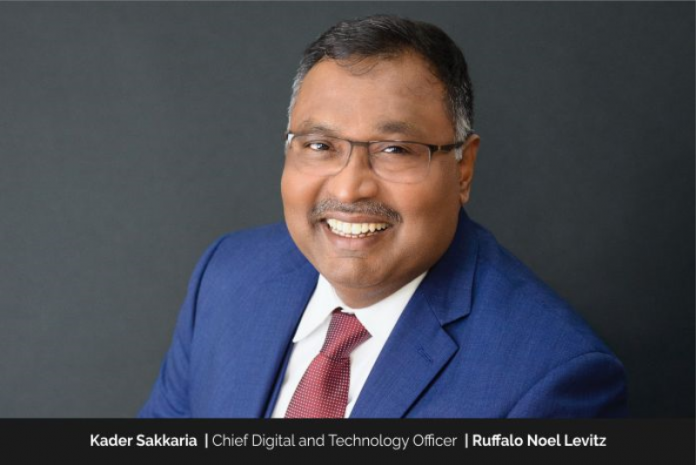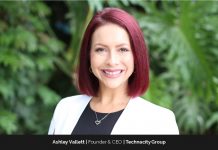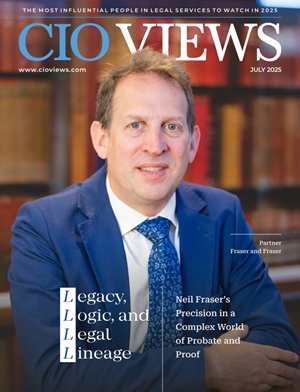
Kader Sakkaria is a force to be reckoned with in the world of technology and digital transformation. As the Chief Digital and Technology Officer at RNL, he is responsible for driving innovation and growth through strategic initiatives.
But Kader’s expertise goes beyond RNL. Prior to joining the company, he oversaw technology and digital transformation initiatives at Cartus/Realogy. He also served as the head of business, technology, and portfolio management at BMO Harris Bank. Kader has a track record of leading large-scale technology transformation initiatives for Fortune 500 companies like Deloitte and Accenture.
With deep vertical expertise in real estate, healthcare, logistics, financial services, consumer products, and industrial products, Kader has worked across a range of industries. He was even the country head for TransUnion in South Asia.
Kader’s educational background is just as impressive. He earned a master’s in computer science from the University of Madras in India, and an MBA in global management from the prestigious Kellogg School of Management at Northwestern University.
It’s clear that Kader’s experience and education have prepared him to be a top tech leader in the industry. Companies across multiple industries are lucky to have him drive their digital and technology transformations.
Motivation to leading in Tech Advanced Era
Kader’s motivation for joining the tech world stemmed from the digital transformation that propels organizations to achieve greater value for society. Education is deemed one of the most significant areas where contributions can be made. Digital transformation plays a crucial role in the evolution of technology-centric companies. RNL is a driving force for higher education institutions and non-profits that are not primarily focused on information technology. The complexity of transforming businesses in today’s technological landscape is recognized by many leaders. As such, organizations require leaders who comprehend the challenge and are equipped to utilize appropriate frameworks such as McKinsey’s 7S model and the digital value chain framework to steer transformations. Designing, optimizing, and innovating business processes demand experience and preparedness to tackle obstacles.
Technology-driven businesses use a multi-dimensional value system to create and measure their impact on the market and society. According to Kader, for companies to achieve success, they must implement a comprehensive system of actions that align with their strategic plan. Success is dependent on a variety of factors, including cross-functional teams of professionals who thrive in a fast-paced environment. As a successful leader, one must prioritize building a product-centric mindset, developing an organizational culture that fosters innovation and scalability, and promoting collaboration. Organizations are intricate systems that need to consider external measurements and evaluations such as financial performance, competitive position, time-to-market reduction, scalability improvements, and market share to gauge their success. Although leveraging technological advancements is a critical element of success, it can be challenging to quantify.
Using Systematic Strategy to Resolving Challenges
Kader believes that leaders must be willing to tackle the various challenges that come with any managerial position. These problems can be categorized into different degrees of generality, such as dealing with tech debt and legacy systems, addressing cybersecurity risks, and managing budgets and resources. At a higher level, leaders must focus on aligning technology with organizational strategic goals. However, before any digital transformation can take place, leaders must address the root causes of obstacles, such as risk-averse cultures, outdated processes, and an unclear vision. Collaborative communication among departments and groups is essential for building and executing strategic plans.
Furthermore, organizations are facing global challenges related to attracting and retaining talent and a shortage of needed competencies. To gain and sustain a competitive advantage, leaders must focus on proactive professional development, retention, and team-building strategies. Recruitment is also a critical function, especially for organizations that operate globally with distributed teams across different time zones, cultures, and legal environments. Therefore, leaders must be systematic and forward-looking in managing their teams to overcome these challenges.
A Leading Provider of Higher Education Analytics Solutions
Ruffalo Noel Levitz, commonly known as RNL, is a prominent provider of data-driven solutions for higher education institutions, specializing in enrolment modelling, student success management, resource allocation management, marketing insights, and fundraising planning. With over 1900 clients, RNL aims to provide personalized engagement to help institutions achieve their long-term objectives. Their engagements are based on data-driven analysis of market research, enrolment consulting, academic advising, and student success throughout the academic life cycle. RNL is committed to technology leadership and has a stable and scalable computing platform, which includes AI-driven data analytics, personalized consulting services, and real-time machine learning capabilities. Currently, RNL is undergoing a digital transformation strategy that aims to integrate and scale all value chain processes. Their new system architecture provides state-of-the-art support for integrating client data sources, advanced data engineering capabilities, and real-time model execution. They also use advanced dashboards to customize and democratize their technologies, providing instant feedback to their clients.
Way to Successful Digital Transformation
In discussing digital transformation, Kader suggests that an effective way to approach it is by identifying contributions that impact essential attributes and organizing them using an organizational learning framework. However, it’s important to acknowledge that such transformative changes can be disruptive and require organizational learning. To this end, it’s necessary to establish priorities and plans for all processes, which will form a solid foundation for corporate adoption and education. Kader suggests that the Six Sigma framework is ideal because it’s a robust organizational plan that’s compatible with agile project management.
To ensure successful digital transformation, it’s crucial that leaders understand all aspects of the transformative processes within the institutional value chain. This can take some time, and the process is often iterative, with several stages involved. The first stage involves continuous learning, which is a by-product of planning, research, development, and deployment of transformative technologies. This stage requires collaboration and a shared vision, and it involves experimentation, rapid process improvement, and adoption. The goal is to extract and document lessons from what works and what doesn’t, a concept referred to as “scalable learning.” Finally, to foster a culture of innovation, it’s essential to reward risk-takers, even if the results are not always organizationally beneficial.
“A true digital transformation would enable organizations to do this across the value chain and recognize that monitoring and improving the technology is a part of the operations,” says Kader.
Kari Kovar joined the team as the Chief Operating Officer in January 2021, having spent the past two decades improving the world of higher education.
Together with their teams, Sakkaria and Kovar created operational alignment and streamlined the technology ecosystem to drive effectiveness, efficiency, outcomes, performance, and collaboration.
Advocating the Significance of Upholding Social Values
As a leader, Kader sees that creating a culture of innovation, excellence, and integrity is one of the most rewarding aspects of leadership. It’s a privilege to make a positive impact on society, and to achieve a culture of excellence, organizations must come together to uphold the highest social values and establish mechanisms that promote ethical behavior, discouraging behaviors aimed at achieving short-term, narrowly defined quick wins.
Organizational integrity is a global issue that multinational corporations are increasingly addressing through ESG regulations, often voluntarily. In a highly competitive global market, organizations are constantly seeking funding and recognition, and a transparent and comprehensive principle-based program can help build trust and increase the value of a brand. Socially responsible programs rooted in ethics and integrity, such as honesty, responsibility, fairness, and accountability, can also help promote data protection, privacy, fairness, and environmentally conscious policies.
While all organizations have a moral obligation to conduct business according to the highest standards, it is ultimately the responsibility of all employees to act with integrity in their daily activities. To build a culture of business integrity, it is crucial to create professional development programs that emphasize responsible conduct throughout the entire value chain and at all levels. Effective policies and processes for handling allegations and investigating potential issues in a timely, fair, and transparent manner are also essential.
Innovation-centric Business Processes
RNL’s strategic plan focuses on building an AI-centric organization through innovation, which includes streamlining and automating processes, democratizing AI tools, and creating scalable value chains. They have improved their data integrations, engineering, and analytics to ensure scalability and flexibility while also making the technology accessible to all team members. RNL has achieved this by exposing analytics through low-code and no-code user interfaces and democratizing modelling through a data governance framework. They also have built-in safeguards for performance monitoring and allow for customization of customer-facing applications. Moving forward, RNL plans to integrate more data sources, convert legacy data, and orchestrate data flows using ontology-driven pipelines and no-code tools. They aim to improve integration of synthetic data sets with semantically rich structures to advance AI capabilities.
Always Lead with a Clear Vision
Kader has always been focused on vision and transformation since he began his career. Having a vision is essential, as it paints a picture of the future and helps to communicate a story to stakeholders. It’s not necessary to hold a C-suite position to have a vision, as many people start innovating and driving change early on in their careers. Those with a clear vision can simplify long chains of subsequent decisions and set the desired direction, which is also critical for motivating people. Even in a non-leadership position, one can inspire others to take action in the right direction and become part of strategic vision initiatives. Coordination is another aspect that can be managed without being intrusive, especially if there is a shared vision. In his career, Kader excelled and grew in these initial areas of focus.
Successful initiatives are not always about glamorous transformations and huge budgets. Sometimes, a simple, focused, and straightforward message can be enough to get all the stakeholders on board quickly. Although the specific steps and strategies can get complicated in larger organizations, it’s essential to execute the vision successfully.
Kader’s transformational initiatives at RNL resulted in his winning the CIO of the Year Chicago ORBIE award. This award recognized the extensive collaborative strategic project that transformed the organization into an AI-centric one with scalability and process automation for all analytics value chains.
Embracing Energy and Focus on Every Aspect of Work
Kader is a person who embodies the concept of energy. This attribute is applicable in every aspect of his life and is something that never stops or slows down. If he were to be defined by a single word, “energy” would be the closest one. At RNL, they are in the final stages of realizing their strategic vision, which involves shifting their focus from ideation to fine-tuning and feedback. However, this does not mean that they have stopped pursuing new ideas.
An essential aspect of their organizational learning framework is that it never stops. They must continue taking risks and pushing beyond their comfort zones. Even though Kader’s regular day may involve routine tasks like day-to-day operations and budgeting, he prioritizes meeting with his teams and gathering their experiences. They don’t ignore problems; instead, they seek rational solutions that help them learn and grow. Kader actively solicits ideas and opinions from all business units, and they maintain ambitious goals and high standards.
In his day-to-day activities, Kader is also an observer of organizational life. He understands that people are the most crucial aspect of any organization, and teams that embrace the future tend to be happier than those that resist it. Watching his team grow and have a sense of purpose is one of Kader’s greatest sources of satisfaction.
Achieving Work-Life Balance as a CIO
Kadar recognizes that managing the responsibilities of a CIO is challenging, and he believes that achieving work-life balance is crucial for a fulfilling life. For him, family is the key to maintaining balance, and he emphasizes that work should not consume one’s entire life. He takes deliberate actions to set aside time for his family and enjoys traveling as a way to disconnect and recharge. Kadar believes that a rewarding career makes it easier to work extended hours when necessary, and he finds that to be true in his own experience.
Ways to Keep Your Team Motivated
Kadar believes that motivation is a multi-dimensional concept that is influenced by various factors, such as the organizational environment and individual personalities. He suggests that to build a coherent framework for motivation, it is essential to look at sources of behavioural stimulus for diverse groups of people.
According to Kadar, intrinsically motivated employees seek challenges and require an environment that fosters growth and development. On the other hand, morally motivated employees need opportunities to demonstrate their value creation outcomes for the greater good, such as social and corporate contributions.
To effectively motivate employees, Kadar suggests using the interactionist view, which considers both the organizational environment and individual personalities. Leaders who focus on listening and understanding their employees’ competencies and values can provide direct support through professional development, bonus structures, or growth opportunities.
Kadar also believes that feedback is an effective form of motivation, which can take the form of task feedback or social feedback. Motivational efforts are most effective when individuals perceive positive aspects of their professional life as personal successes within their dimensions of preference. Therefore, explicit communication with teams is essential to creating that state.
More New Innovation in the Future
The RNL team and Kader are confident in the success of their innovation-focused strategic plan, having accomplished most of their formulated milestones. They aim to continue building the company on a foundation of innovation and social responsibility to meet customer expectations and stay ahead of the competition. However, the economy’s uncertainty and advances in AI and metaverse technologies create disruptive changes, making it essential for leaders to understand market forces and prepare for productizing new technologies. As ESG reporting programs become more common, responsible technology use will be a focus for organizations. The job market will also shift, with candidates prioritizing diversity, inclusion, and making a larger-scale impact.
A message for all aspiring Tech Enthusiasts
According to Kadar, the information-processing world is currently undergoing a rapid transformation, with enterprise systems increasingly moving towards big data, integrations, and advanced algorithms. This shift is presenting exciting opportunities for aspiring technologists, as market trends indicate significant growth potential for the next several years.
Kadar suggests that in 2023 and beyond, teams will likely leverage complex analytics to integrate data across various disciplines, and aspiring technologists should focus on areas where multimodal data integration occurs. For instance, combining images, text, voice, sensor information, and synthetic data can help develop innovative products and services. Kadar believes that the adoption of information technologies in scalable architectures will rapidly diffuse into applications using rich interactive modalities driven by large language models and other NLP technologies. Standardized tools like infrastructure as code and system deployment frameworks will empower software engineers to build digital-twin architectures and shorten development cycles, which can significantly boost productivity.
In addition to technological advancements, Kadar notes that there is also an emerging focus on regulations and compliance. Numerous new positions and opportunities are arising to report and ensure compliance with voluntary and mandatory guidelines and rules affecting practically all data processing systems. Individuals who understand the transition from closed data architectures to a “glass box” approach will be in demand. Building trust in the marketplace requires explain ability, transparency, and responsibility, and the days of superficially labelling and promoting advanced technologies are likely over, according to Kadar.




















